Shanghai#
by Stanislav Sedov and
Dmitry Moiseenko,
members of the AirPano Team that is a member of the global-geography Consortium.
20 June 2013
with kind permission of AirPano
The first day in Shanghai
From the first moment in Shanghai I had a feeling that I was surrounded by endless construction sites. The area where we were staying looked like an anthill; we were surrounded by a crowd of people, heavy traffic, and scooters that were all over the place, even on the sidewalks.
We went to sleep without any strength left. In the morning, while cursing at the damned alarm clock, we barely woke up at 4pm local time. The weather outside was foggy (we couldn't tell if it was due to smog or heavy clouds). It didn't change in the evening either, but we still had to go shooting. We crawled out to the street where the first communication problem was waiting for us: taxi drivers stationed near our hotel didn't understand where we needed to go or pretended not to understand. In the end we had to go by foot. Past three or four blocks we realized that we wouldn't make it to the embankment before sunset. Dima managed to catch a taxi, and we had a fast and cheap trip to our destination.
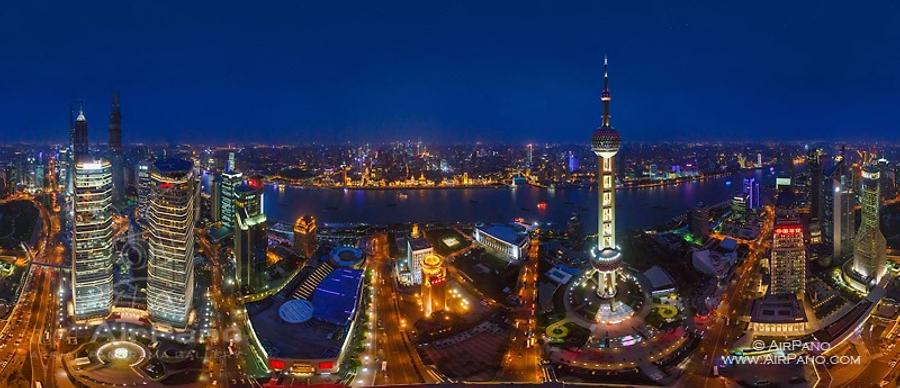
We chose a little square where we unpacked our equipment and launched the helicopter. Dima suggested a very busy place for the evening and night shooting — the area around big flowerbed near the television tower. It was a heavy traffic area (with very lively crossroad), not to mention the square was surrounded by an overpass with the crowd of local people and tourists. There were too many people. At that point we couldn't find a better place and had to launch our helicopter.
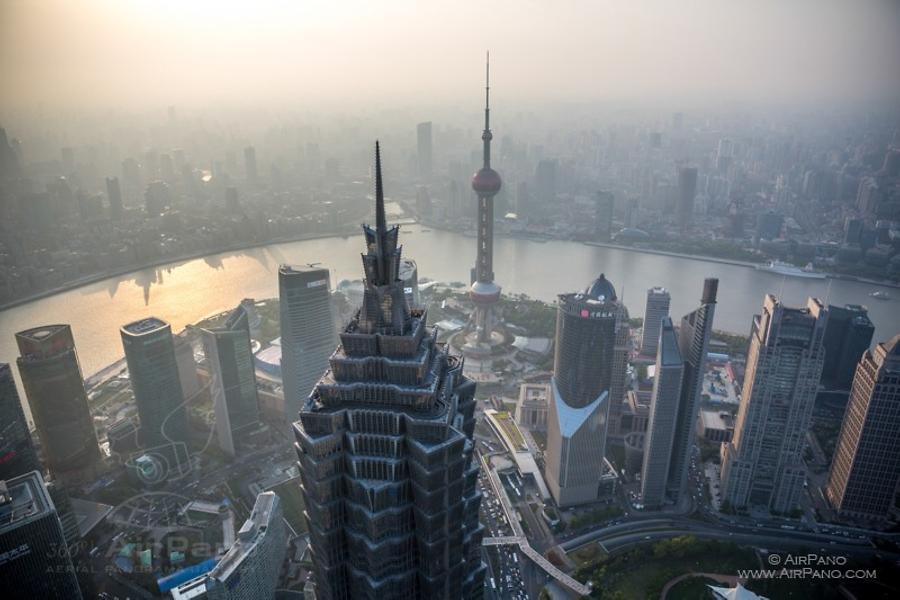
It was getting dark fast. The helicopter flew up into Shanghai evening sky, and Dima kept saying that television tower refused to fit into the frame. It was a very crucial moment, not only because we were launching the helicopter over our heads, but the altitude was higher than 200 meters. And, finally, Dima said that everything worked out. The flying altitude was 270 meters. For a night flight it was so awesome!
It made me realize that Shanghai was a very difficult place for taking pictures with a radio-controlled helicopter. There were too many high-rise buildings. Some were higher than 400 meters. But locals were very friendly: they seemed to be interested in what we were doing and even took some pictures with us. We weren't bothered by police. We had everything to continue our work.
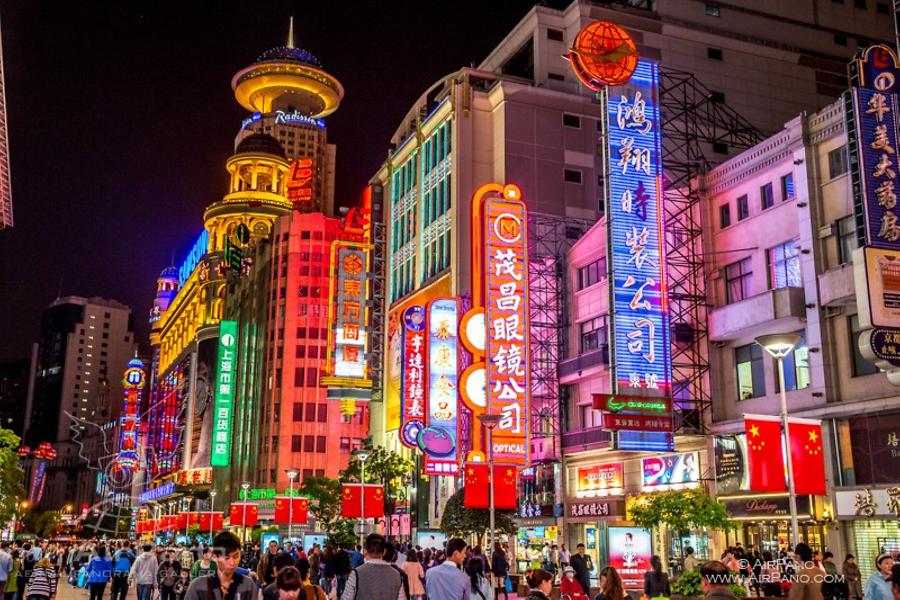
Shanghai. Day two
Elated by our yesterday's success of high altitude flight, we decided to raise the bar and launch the helicopter in the middle of a small park that was surrounded by high-rise buildings; but a guard came up to us and ordered us with gestures to stop the launch.
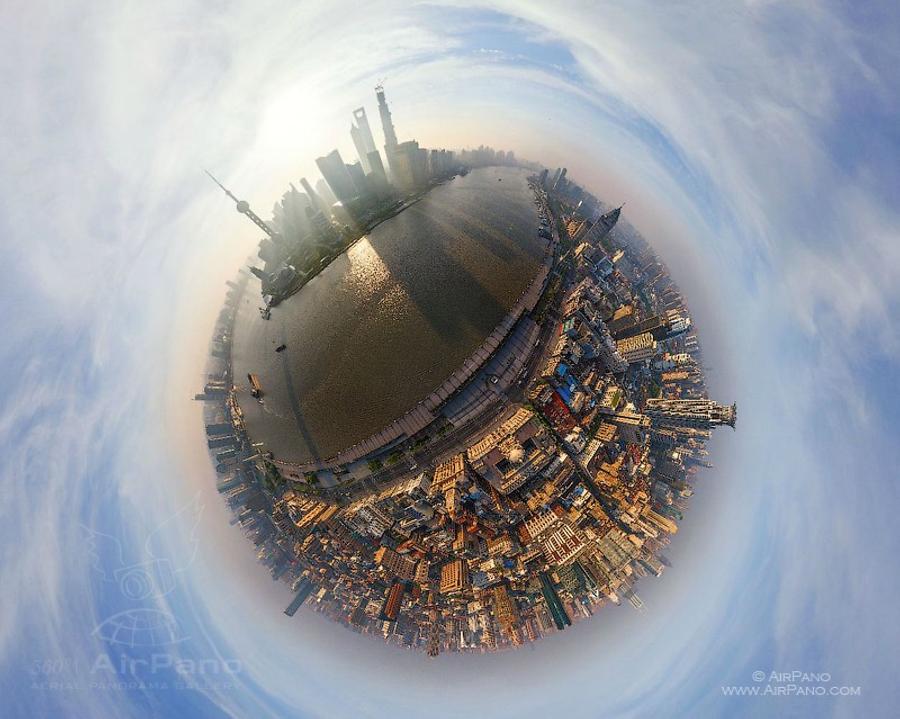
At first we pretended not to understand him, then we showed him our photos and explained that all we wanted to do was to take some pictures, and then, suddenly, Dima noticed radio-controlled helicopters inside one of kiosks not far from our starting point. Dima went up to the kiosk window and pointed to the helicopters, implying that we were trying to fly the same thing that was sold there. I couldn't understand the logic of that one minute pantomime, but the guard seemed to understand him and started consulting someone on the radio transmitter. After finished his conversation, he shook his head, but with less confidence than when we first met. I smiled and made a waving motion so he would step away from our launching point. He decided not to resist and joined the rest of the observing crowd gathered around us.
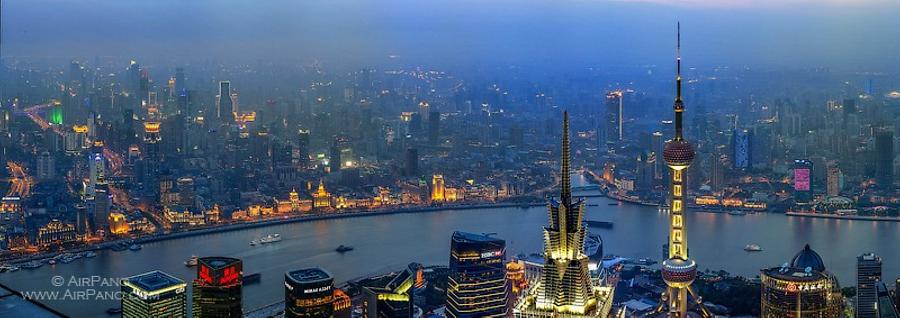
Generally speaking, Chinese were very curious, just like little children. Wherever we decided to launch our helicopter, we were momentarily surrounded by a small crowd of people. But if we didn't ask them to move they would get in our way: they would push us aside or try to look into the monitor, standing right in front of us.
Nothing interesting happened that day. Except, maybe, when a guard (or policeman, one couldn't tell by their uniform) approached us on the embankment and forbid us to launch the helicopter. I played dumb and ignored his request. He consulted someone on the radio transmitter, and in the end allowed us to launch the helicopter. After we landed our helicopter and showed him some of the pictures, we parted as friends.
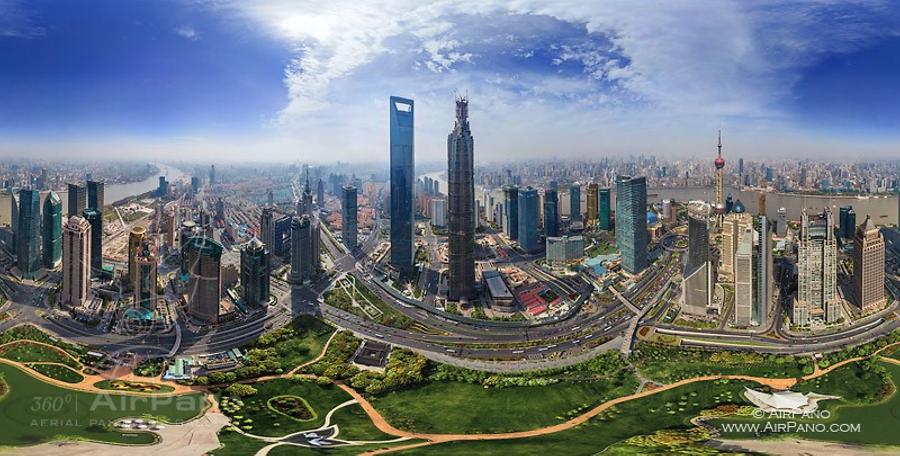
When we finished shooting on the embankment, we headed towards the park. I asked Dima, "Where are we running?"
"We won't make it in time! It's getting dark very fast! I can hardly see anything!"
"Dima, would you mind taking off your sunglasses?!"
" ![]() ))))))"
))))))"
During our second night flight we beat a new high altitude record — 300 meters above the ground.
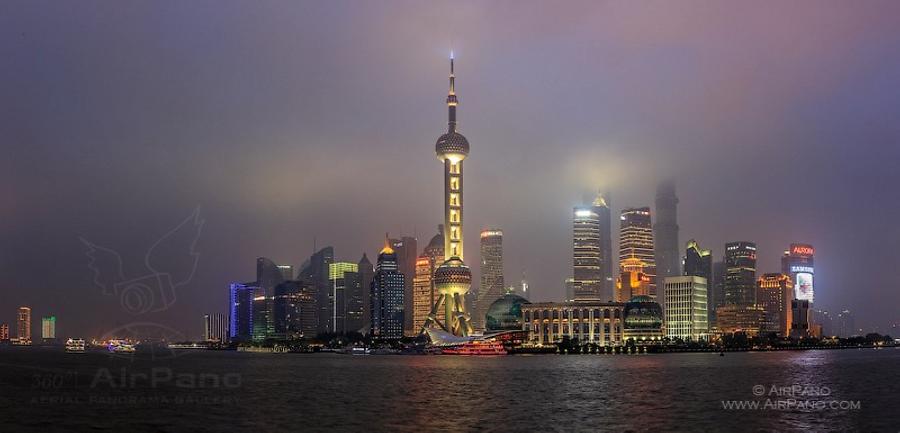
Our stay in Shanghai was coming to an end, but it seemed we were able to show the most interesting places in the center of the city, that convey the atmosphere of an ultra-modern metropolitan city.
And now a few facts about Shanghai:
Not many cities can boast as many records as Shanghai, China's largest city, the world's most densely-populated metropolis, and the largest seaport on the planet.
Shanghai's lands have been inhabited from ancient times: people who lived here were engaged in agriculture, fishing and salt production. The land had been passed from one dynasty to another, until this fishing village, with its favorable location on the Yangtze River near the East China Sea, was given an official status in year 751.
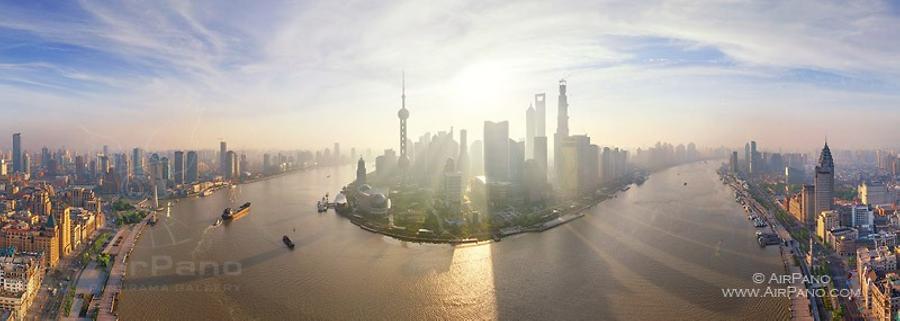
During the centuries of Shanghai's history, the city has seen both peacetime and war: it was invaded and bombed, and then, with new powers, it was restored again. But only in 1992 Shanghai entered a fast development phase, which allowed it to become the leading city in the country, and then in the whole world. And now it's one of the world's major financial centers, the core of China's political intrigues, and, at the same time, the cradle of modern Chinese cinema and theater.
Despite the fact that the city is full of ancient temples and cozy side streets with houses built in the beginning of the last century, the first real symbol of Shanghai is the urban landscape. Modern buildings have a unique architecture, and the shape of their upper floors resemble flying saucers. One of the most amusing creations is a pedestrian ring-bridge built in Pudong district in 2012. You can go up as high as 6 meters above the ground by using stairs or escalators, and the pedestrian part of the bridge is so wide that you can line up 15 people in a row. In the evening the bridge has a very beautiful illumination.
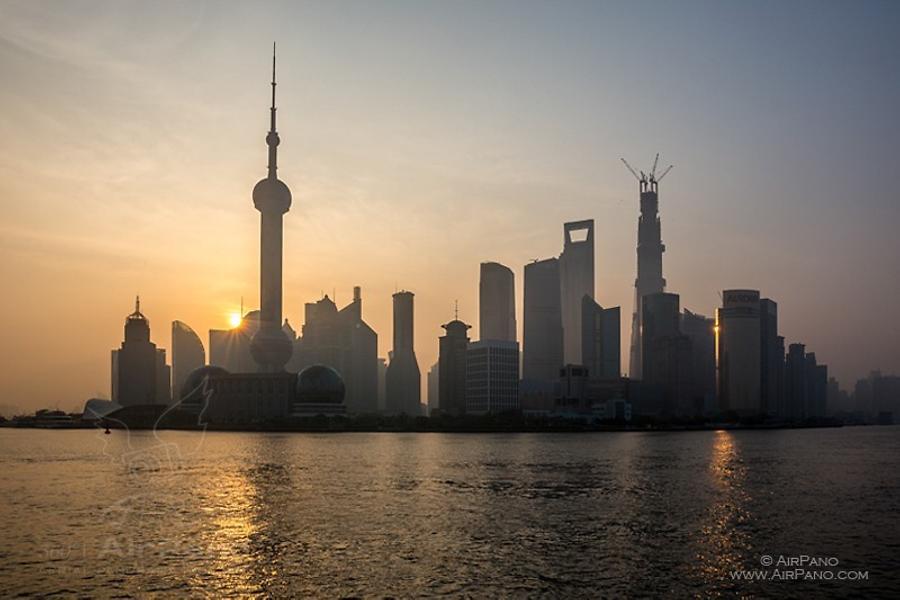
Another most important Shanghai landmark is the Bund, a waterfront area on a plot of 1.5 kilometers with 52 buildings of different styles, from Gothic to Art Deco. Because of that it's often called "the museum of world architecture." Since 2003 it also houses Aurora Plaza, a beautiful 185-meter tower on the other side of the river. At night it turns into a huge screen broadcasting various videos that can be seen from the promenade: from commercials to news reports.
There are more than 80 buildings higher than 170 meters in Shanghai. The most famous skyscraper, which ends up in any album of Shanghai photos, is a 492-meter high World Financial Center. It is crowned with a strange trapezium-shaped window intended to reduce air resistance. Initially, the window was round, but some people thought it was associated with the sun on the flag of Japan. As a result, the circle turned into trapezium, and building started to look like a giant beer bottle opener. Nowadays it's the highest building in the city, although it's threatened to be overshadowed by another 632-meter high skyscraper that is being built in the Pudong district with a predictable name Shanghai.
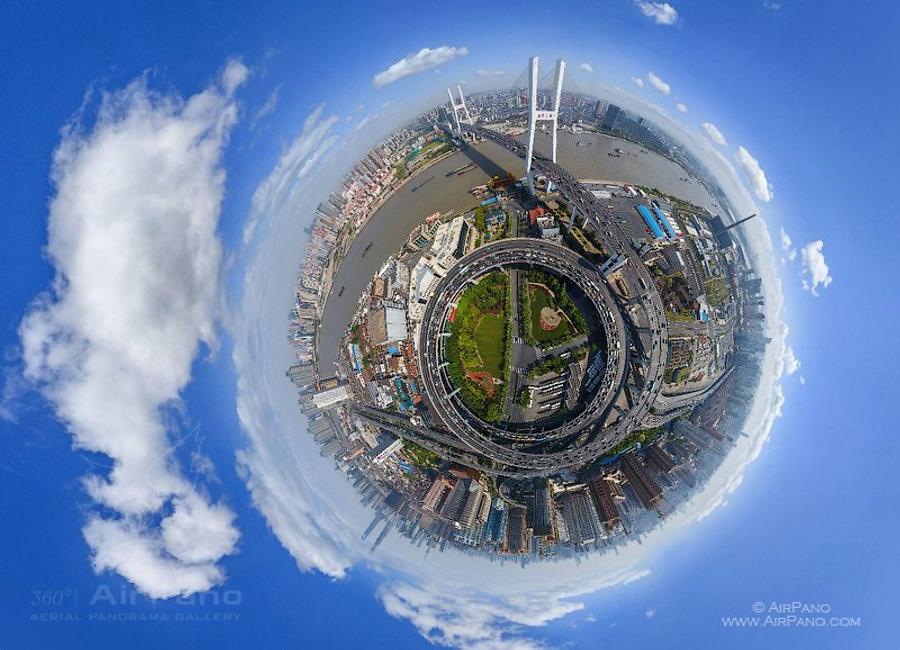
I can tell you endless stories about different sights of Shanghai, the city where antiquity meets modern civilization, tradition crosses with avant-garde, and green parks are framed in glass and concrete, but why should I? You can enjoy this magnificent scenery through our panoramas!